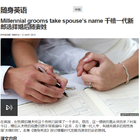
千禧一代新郎选择婚后随妻姓
介绍: No one knows how long humans have been giving themselves names, but one thing is sure: surnames are a much more recent idea than given names. In Europe, surnames were developed to distinguish between individuals who had the same moniker. They were brought to the UK by the French nobility following the Norman ...
介绍: No one knows how long humans have been giving themselves names, but one thing is sure: surnames are a much more recent idea than given names. In Europe, surnames were developed to distinguish between individuals who had the same moniker. They were brought to the UK by the French nobility following the Norman Conquest around the 12th century and became common around the 14th century.
Another tradition that the Normans introduced was that of coverture. This was a law which said that a woman became a man's property when they got married. In those days, only a man could be the head of the family and allowed to own property. At this point the bride lost her maiden name. Over time, this has led to the tradition that upon marriage a woman relinquishes her maiden name and takes on her new husband’s family name.
Fast forward to the present. These days a woman choosing not to change her name to match her husband’s after marriage has long been a norm. The first recorded case is widely believed to be an American suffragette called Lucy Stone. When she got married in 1855, she refused to take her husband's name. After that, other ideas such as merging and double-barrelling also became common.
However, it would seem that a new trend is arising. One in ten millennial males is now electing to replace their surname with their wife’s. That's according to a recent study of 2000 UK adults by Opinium, a strategic insight agency. In a BBC article, Rory Dearlove née Cook, explained that for him it wasn’t important to keep his surname. He thought it would be nice for his wife and him to have the same last name. The bride, Lucy, had made it clear before getting married that she had no intention of changing hers, but thought that he would keep his too. “He's entitled to keep his just as I am entitled to keep mine,” she commented.
Other men had different reasons. Charlie Shaw, dubbed 'Morley' at birth, explained that it was, “a gesture of allegiance and an opportunity to acknowledge the unseen patriarchal bias and sexism in our society.” It’s worth noting that, in the UK at least, only the fathers of the couple being married are on the marriage certificate. The mothers do not appear at all.
However, not everyone is in favour of altering tradition. Rachel Robnett, a researcher at the University of Nevada, surveyed a number of people in the US and UK and found that a man whose wife keeps her maiden name is viewed as ‘feminine’, while the woman was believed to ‘wear the trousers’. And when one family found out that their son was to take his wife’s name, they refused to attend the wedding. To them it was proof that he was totally under the thumb.
‘What’s in a name?’ Shakespeare asked in Romeo and Juliet. It would seem, depending on who you talk to, a great deal. Whether maintaining traditional naming conventions, keeping the surname, or swapping names, these days at least there is a choice to be made.




